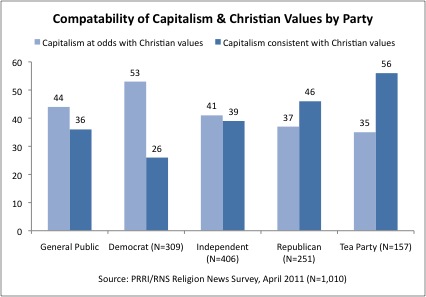I. Ambivalence about Compatibility of Capitalism and Christianity
Overall more Americans believe that Christian values are at odds with capitalism and the free market than believe theyare compatible. This pattern also holds among Christians. Among Christians in the U.S., only 38% believe capitalism and the free market are consistent with Christian values while 46% believe the two are at odds. Religiously unaffiliated Americans look similar to the general population and to Christian Americans, with a plurality (40%) saying capitalism is at odds with Christian values, compared to 32% who say they are compatible; 14% say they do not know. There are significant differences by gender, party and income.

For instance, half (50%) of women believe that capitalism and Christian values are at odds, compared to 37% of men.
A majority (53%) of Democrats believe that capitalism and Christian values are at odds compared to 26% who believe they are compatible. Among Republicans, only 37% say Christian values and capitalism are at odds, and nearly half (46%) say the two are compatible. Among Americans who identify with the Tea Party, a solid majority (56%) say that capitalism is consistent with Christian values; only 35% believe they are at odds.
Nearly half (46%) of Americans with household incomes of $100,000 a year or more believe that capitalism is consistent with Christian values, compared to only 23% of those with household incomes of $30,000 a year or less.
II. Increasing wealth inequality one of the biggest problems in America
More than 6-in-10 (62%) Americans believe that one of the biggest problems in this country is that more and more wealth is held by just a few people. About 1-in-4 (24%) say that this is not that big a problem.
Young people (age 18 – 34) are significantly more likely than older Americans (age 65+) to believe that one of the biggest problems in the country is that more and more of the wealth is held by just a few people (71% to 56%).
Among white evangelical Protestants, 55% say that one of the biggest problems in the country is that more and more of the wealth is held by just a few people compared to three-quarters (75%) of Americans with no religious affiliation. Nearly one-third (32%) of white evangelical Protestants say that this is not that big a problem.
Three-quarters of Democrats and even a plurality (47%) of Republicans say that one of the biggest problems in the country is that more and more of the wealth is held by just a few people. Those identifying with the Tea Party are evenly divided on this question (41% not that big a problem, 40% one of the biggest problems).
III. Fair for wealthier Americans to pay more taxes
Nearly two-thirds (66%) say that it’s fair for wealthier Americans to pay more taxes than the middle class or those less well off.
Younger people (age 18-34) are significantly more likely than older Americans (age 65+) to say it’s fair for wealthier Americans to pay more taxes than others (75% vs. 62%).
There is agreement across party lines, with 58% of Republicans and 75% of Democrats saying it’s fair for wealthier Americans to pay more taxes. Those identifying with the Tea Party movement are evenly divided on this question (49% agree, 50% disagree).
Strong majorities of all religious groups except white evangelicals also say it’s fair for wealthier Americans to pay more. White evangelicals are evenly divided on this question (50% agree, 49% disagree).
Overall most (61%) Americans disagree that most businesses would act ethically on their own without regulation from the government. Less than 4-in-10 (37%) believe that they would. This holds true across political and religious lines, with the lone exception of those who identify with the Tea Party movement (53% agree).
IV. Mixed opinions about clergy speaking out on economic issues
Generally, Americans across the religious landscape agree clergy should be speaking out on social issues, but are more divided about economic issues. Minority Christians stand out as one group that says it is important for clergy to speak out about a range of economic issues in addition to social issues. More religious groups say it is important for clergy to address the gap between the rich and the poor than other economic issues.
Sixty-one percent of minority Christians, 61% of Catholics and 51% of white evangelical Protestants say this is an important issue for clergy to address.
Among those identifying with the Tea Party, more say it is important for clergy to address social issues like abortion (61% very important) than economic issues like reducing the deficit (37% very important).
Nearly 6-in-10 Americans (58%) believe that the federal budget is a moral document that reflects national priorities while 41% disagrees. Americans across the political and religious landscape agree that the federal budget is a moral document that reflects our national priorities.
Recommended citation:
Jones, Robert P., and Daniel Cox. “Plurality of Americans Believe Capitalism at Odds with Christian Values.” PRRI. 2011. http://www.prri.org/research/plurality-of-americans-believe-capitalism-at-odds-with-christian-values/.


